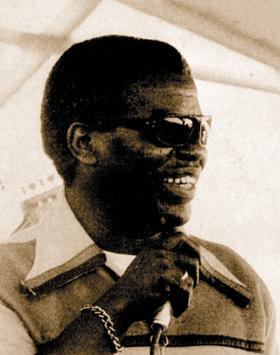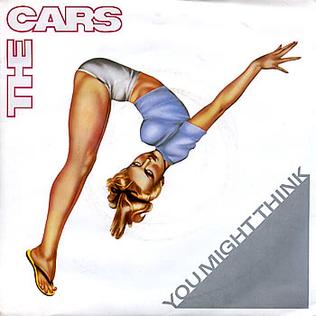Related Research Articles
Rhythm and blues, frequently abbreviated as R&B or R'n'B, is a genre of popular music that originated in African-American communities in the 1940s. The term was originally used by record companies to describe recordings marketed predominantly to urban African Americans, at a time when "urbane, rocking, jazz based music ... [with a] heavy, insistent beat" was becoming more popular. In the commercial rhythm and blues music typical of the 1950s through the 1970s, the bands usually consisted of a piano, one or two guitars, bass, drums, one or more saxophones, and sometimes background vocalists. R&B lyrical themes often encapsulate the African-American experience of pain and the quest for freedom and joy, as well as triumphs and failures in terms of relationships, economics, and aspirations.

Antoine Dominique Domino Jr., known as Fats Domino, was an American pianist, singer and songwriter. One of the pioneers of rock and roll music, Domino sold more than 65 million records. Born in New Orleans to a French Creole family, Domino signed to Imperial Records in 1949. His first single "The Fat Man" is cited by some historians as the first rock and roll single and the first to sell more than 1 million copies. Domino continued to work with the song's co-writer Dave Bartholomew, contributing his distinctive rolling piano style to Lloyd Price's "Lawdy Miss Clawdy" (1952) and scoring a string of mainstream hits beginning with "Ain't That a Shame" (1955). Between 1955 and 1960, he had eleven Top 10 US pop hits. By 1955, five of his records had sold more than a million copies, being certified gold.

Earl Cyril Palmer was an American drummer. Considered one of the inventors of rock and roll, he is a member of the Rock and Roll Hall of Fame.

"Rapper's Delight" is a 1979 hip-hop track by the Sugarhill Gang, produced by Sylvia Robinson. Although it was shortly preceded by the Fatback Band's "King Tim III ", "Rapper's Delight" is credited for introducing hip-hop music to a wide audience, reaching the top 40 in the United States, as well as the top three in the United Kingdom and number one in Canada. It was a prototype for various types of rap music. The track interpolates Chic's "Good Times", resulting in Chic's Nile Rodgers and Bernard Edwards threatening to sue Sugar Hill Records for copyright infringement; a settlement was reached that gave the two songwriting credits. The track was recorded in a single take. There are five mixes of the song.

Christophe Kenner was an American, New Orleans-based R&B singer and songwriter, best known for two hit singles in the early 1960s, "I Like It Like That" and "Land of 1000 Dances", which became staples in the repertoires of many other musicians.

"Ain't That Peculiar" is a 1965 song recorded by American soul musician Marvin Gaye for the Tamla (Motown) label.
Jubilee Records was an American independent record label, specializing in rhythm and blues and novelty records. It was founded in New York City in 1946 by Herb Abramson. His partner was Jerry Blaine. Blaine bought Abramson's half of the company in 1947, when Abramson went on to co-found Atlantic Records with Ahmet Ertegun. The company name was Jay-Gee Recording Company, a subsidiary of the Cosnat Corporation. Cosnat was a wholesale record distributor.
"The Hunter Gets Captured by the Game" is a 1966 song written by Smokey Robinson. It was a hit single in 1967 for the American girl group The Marvelettes for the Motown label, from their self-titled album released that same year. In 1980, Jamaican singer Grace Jones remade the song and had minor success with her version in the US.

"Shop Around" is a song originally recorded by the Miracles on Motown Records' Tamla subsidiary label. It was written by Miracles lead singer Smokey Robinson and Motown Records founder Berry Gordy. It became a smash hit in 1960 when originally recorded by the Miracles, reaching number one on the Billboard R&B chart, number one on the Cashbox Top 100 Pop Chart, and number 2 on the Billboard Hot 100 chart. It was the Miracles' first million-selling hit record, and the first-million-selling hit for the Motown Record Corporation. This landmark single was a multiple award winner for the Miracles, having been inducted into the Grammy Hall of Fame in 2006, inducted into The Rock and Roll Hall of Fame as one of The 500 Songs That Shaped Rock and Roll, and honored by Rolling Stone as #500 in their list of The 500 Greatest Songs of All Time, dropping it 5 spots from #495 in the 2004 version.
Joseph Charles Jones was an American R&B singer, songwriter and arranger, who was born in New Orleans, Louisiana, United States. Jones is also generally credited with discovering the Dixie Cups. He also worked with B.B. King. As a singer, Jones had his biggest hit in the form of the Top Five 1960 R&B hit "You Talk Too Much", which also reached No. 3 on the Billboard Hot 100 chart.
"Walking to New Orleans" is a 1960 song by Bobby Charles, written for and recorded by Fats Domino. The record was a hit, released on Imperial Records, reaching #6 on the pop chart and #2 on the R&B chart.

"You Might Think" is a song by American rock band The Cars from their fifth studio album, Heartbeat City (1984). The track was written by Ric Ocasek and produced by Mutt Lange and the Cars, with Ocasek also providing the lead vocals.
"Hot Blooded" is a song by the British-American rock band Foreigner, from their second studio album Double Vision. It was released as a single in June 1978 and reached #3 on the Billboard Hot 100 chart that September. The single was also certified Platinum by the Recording Industry Association of America. It is also the theme song to the truTV scripted series Tacoma FD.

"Good Times Roll" is a song by American rock band the Cars released as the first track from their 1978 debut album The Cars. Written by Ric Ocasek as a sarcastic comment on rock's idea of good times, the song features layered harmonies courtesy of producer Roy Thomas Baker.

"It's Gonna Work Out Fine" is a song written by Rose Marie McCoy and Joe Seneca. It was originally released by Ike & Tina Turner in 1961 as a single from their album Dynamite! (1962). The record is noted for being their first Grammy nominated song and their second million-selling single after "A Fool In Love".

This page is a discography for American musician Little Richard (1932–2020). Described as "the architect of rock and roll", Little Richard was a pioneering singer-songwriter whose career also encompassed rhythm and blues, soul, and gospel. He began his recording career in 1951, signing to RCA Victor, releasing his first singles, and his first album in 1957, although he released his last album in 1992, he continued to tour into the 21st century. He attained international success after signing with Specialty Records in 1955.

"I Know (You Don't Love Me No More)" is an R&B song written and recorded by American singer Barbara George, released as her debut single in 1961. It became her signature song and her only major hit in United States, reaching number-one on the Billboard R&B singles chart and #3 in the Hot 100. The song was later covered by various artists, inducing Fats Domino, Cher, Ike & Tina Turner, and Bonnie Raitt. A Spanish version by Marisela topped Billboard's Latin chart in 1988. The Shirelles borrowed the melody of "I Know" for their 1963 cover of "Everybody Loves A Lover".

Ric Records, along with sister label Ron Records, were American record labels formed by Joe Ruffino in 1959. Although most of Ric's releases did not rise above regional hits, the label was active during the golden era of New Orleans R&B and was an incubator for many artists who are now recognized as definers of the style.
"Please Love Me Forever" is a song written by John Malone and Ollie Blanchard. The song was originally released by Tommy Edwards in 1958. Hit versions were later released by Cathy Jean and the Roommates in 1960 and Bobby Vinton in 1967.
References
- ↑ Allmusic Joe Jones Biography
- ↑ "Reviews of This Week's Singles: Special Merit Spotlights" (PDF). Billboard: 37. July 18, 1960. Archived (PDF) from the original on 2022-06-27. Retrieved 2020-01-02.
- ↑ Aswell, Tom (2010). Louisiana Rocks!: The True Genesis of Rock and Roll. Pelican Publishing. pp. 109–110. ISBN 9781455607839. Archived from the original on 2021-12-20. Retrieved 2020-10-28.
- ↑ Charnas, Dan (October 17, 2019). "The Rise and Fall of Hip-Hop's First Godmother: Sugar Hill Records' Sylvia Robinson". Billboard. Archived from the original on October 19, 2019. Retrieved January 2, 2020.
- ↑ "Roulette Buys Jones Master From Ric" (PDF). Billboard: 4, 33. October 10, 1960. Archived (PDF) from the original on 2022-06-27. Retrieved 2020-01-02.
- 1 2 "Hot 100" (PDF). Billboard: 34. November 14, 1960.
- 1 2 "Hot R&B Sides" (PDF). Billboard: 36. December 5, 1960. Archived (PDF) from the original on 2022-06-27. Retrieved 2020-01-02.
- ↑ "Honor Roll of Hits" (PDF). Billboard: 32. November 14, 1960.
- ↑ "James & Bobby Purify, You & Me Together Forever". Archived from the original on February 2, 2017. Retrieved January 24, 2017.